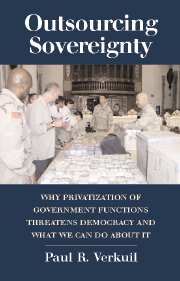 Outsourcing Sovereignty
Outsourcing Sovereignty Book contents
- Frontmatter
- Contents
- Acknowledgments
- Chart
- 1 Introduction and Overview – Why Outsourcing Threatens Democracy
- 2 The Outsourcing of Sovereignty
- 3 Case Study: Public and Private Approaches to Transportation Security
- 4 The Public-Private Distinction
- 5 The Case for Constitutional Governance
- 6 Statutory and Administrative Limitations on Private Delegations
- 7 Outsourcing Government Services: Contract Theory and Practice
- 8 Structural Reforms to Government
- 9 Conclusions (Wherein the Principal Instructs Her Agents)
- Cases
- Bibliography
- Index
6 - Statutory and Administrative Limitations on Private Delegations
Published online by Cambridge University Press: 27 July 2009
- Frontmatter
- Contents
- Acknowledgments
- Chart
- 1 Introduction and Overview – Why Outsourcing Threatens Democracy
- 2 The Outsourcing of Sovereignty
- 3 Case Study: Public and Private Approaches to Transportation Security
- 4 The Public-Private Distinction
- 5 The Case for Constitutional Governance
- 6 Statutory and Administrative Limitations on Private Delegations
- 7 Outsourcing Government Services: Contract Theory and Practice
- 8 Structural Reforms to Government
- 9 Conclusions (Wherein the Principal Instructs Her Agents)
- Cases
- Bibliography
- Index
Summary
NONDELEGATION, SUBDELEGATION, AND DISCRETIONARY ACTS
Once an inherent government power is identified, can it be delegated at all? The nondelegation doctrine does not go that far. In both its Article I and due process faces, the doctrine is about process. The nondelegation requirement is satisfied if Congress provides an “intelligible principle” for the Executive to follow. As was discussed in Chapter 5, the constitutional constraints on delegation are exceedingly difficult to enforce. Carter Coal does, however, call for procedural mechanisms that require government rather than private officials to exercise public power.
But certain government functions may be so fundamental as not to be transferable to private hands under any circumstances. Acts of government committed to high officials, including the president, who have taken oaths to uphold the Constitution are especially sensitive. However, calling some government acts nondelegable does not identify them. What are the functions of government that cannot be privatized?
Nondelegable Duties of Government
Some duties have always been nondelegable. We can all agree with Justice Scalia that Congress cannot hand the legislative power to the president and adjourn sine die. Congress must actually perform its constitutional duties. By a parity of reasoning, the president cannot turn the executive power over to the vice president and retire in office. These are clear examples of nondelegable duties of office under the Constitution. Important powers exercised by cabinet officials and other principal officers presumably must be exercised by those who have taken an oath to uphold the Constitution.
- Type
- Chapter
- Information
- Outsourcing SovereigntyWhy Privatization of Government Functions Threatens Democracy and What We Can Do about It, pp. 121 - 139Publisher: Cambridge University PressPrint publication year: 2007


